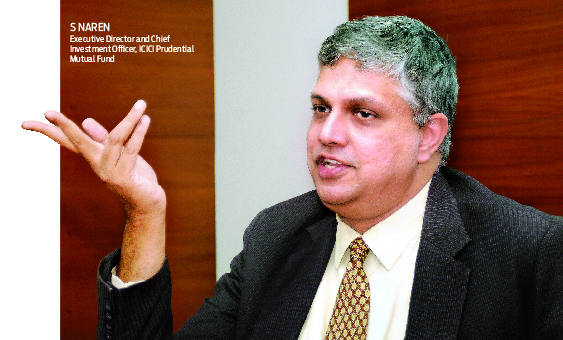It is essential to consider the risk appetite and liquidity needs of the investor. S Naren, Executive Director and Chief Investment Officer of ICICI Prudential Mutual Fund, says that the best approach in these uncertain times is to focus on dynamically managed asset allocation schemes or balanced advantage category of schemes. In conversation with Saibal Dasgupta.
Given the heightened volatility, how are you managing the risks associated with equity funds? Why has the proportionate share of equity-oriented schemes slipped in recent times?
Both in India and globally, selected stocks have so far delivered bulk of the returns. Cyclically, these stocks appear to be in end cycle, while the rest of the market is not. So when it comes to portfolio construction, we have a value bias as several such stocks are available at inexpensive valuations, providing good dividend yield and reasonable earnings visibility.
We believe the drop in equity assets is marginal and is largely on account of coronavirus-related developments. Further, absence of physical infrastructure over the past three months due to nationwide lockdown is another aspect, which has hampered investments, especially from those investors who preferred using traditional means.
As you know, markets go through cycles of boom and bust. Would you advise long-term and medium-term retail investors to take advantage of a major dip or correction?
In March, we had communicated to investors that it was the right time to invest in equity. Due to the ample liquidity provided by the global central banks, over the past few months, equity markets globally witnessed one of its sharpest rallies.
Owing to the pandemic, while there is uncertainty in the near to medium term, we believe that over time economies will recover.
So, the optimal approach to navigate these uncertain times is through dynamically managed asset allocation schemes or balanced advantage category of schemes. These funds will help make the most of such challenging times by tapping into opportunities present across equity and debt asset classes. At the same time, it is heartening to note that the fundamental of India continues to remain strong as the rural economy is robust even amidst the present circumstances.
So, for an investor who is investing in equity for a long-term financial goal, it is important to continue with their Systematic Investment Plans (SIPs). Every correction is an opportunity for a long-term investor to accumulate more units at a reduced cost, so that over a complete market cycle, the investor has the opportunity to make outsized gains.
In terms of debt as an asset class, we believe debt mutual funds have an important role to play in a portfolio. Foregoing this asset class, could prove to be an expensive mistake as debt is the asset class which brings stability to a portfolio. While choosing schemes, it would be advisable to consider the risk appetite and liquidity needs of the investor too. Fund houses which have a demonstrated track record of not facing any defaults or portfolio separation would be an ideal choice for investments.
What are the upcoming trends in terms of investing in the mutual fund industry?
With the increased awareness around mutual funds and the importance of asset allocation for long-term wealth creation. We believe asset allocation or balanced advantage category of funds stands to attract larger investor interest. This category, we believe, has the potential to reach the scale of the present equity Assets Under Management (AUM) of the industry.
Please discuss your investment strategy for different kind of funds.
We have funds, which cater to a wide range of investors through varied investment styles and strategies. All of the funds are managed as per the mandate listed out in the Scheme Information Document (SID). As an AMC, we are believers of asset allocation funds and offer a range of asset allocation products, which are model based with varied level of net equity exposure. Contra and value segments are the categories we believe in. We also have the largest value fund in the mutual fund industry. When it comes to debt, we follow the principal of Safety, Liquidity and Return (SLR). This approach is aimed at optimising risk adjusted returns by investing in high grade credits, efficiently managing duration rate-risk without compromising on liquidity risk.
Please share your views on why the proportionate share of debt-oriented schemes has risen in recent times despite the liquidity crisis?
Investors, based on their investment duration and risk appetite, can consider investing in a variety of debt funds. At a time when the interest rates are on a decline, debt mutual funds have caught the investor attention with robust performance. Over the past two years, even though there were instances of several debt papers of certain schemes going bad, investors have realised that the trouble in debt markets is not systemic in nature. It is business as usual for fund houses with quality debt paper holdings. Going forward, this is one trend we would like to see continuing as it is important for investors to have debt mutual funds as a part of their asset allocation practice as it is a stable asset class. We are of the view that currently both duration and credit offers attractive investment opportunities. Since the yield curve continues to remain steep due to high risk aversion, short and medium duration funds present an interesting investment opportunity. For those who are looking to invest with a longer term investment horizon can consider investing in dynamic duration schemes.
Investors with higher risk appetite can consider investing in credit space. This space remains attractive due to valuation comfort owing to the high spread between accrual schemes and repo, which further provides a good margin of safety for investments made.
saibal@outlookindia.com

